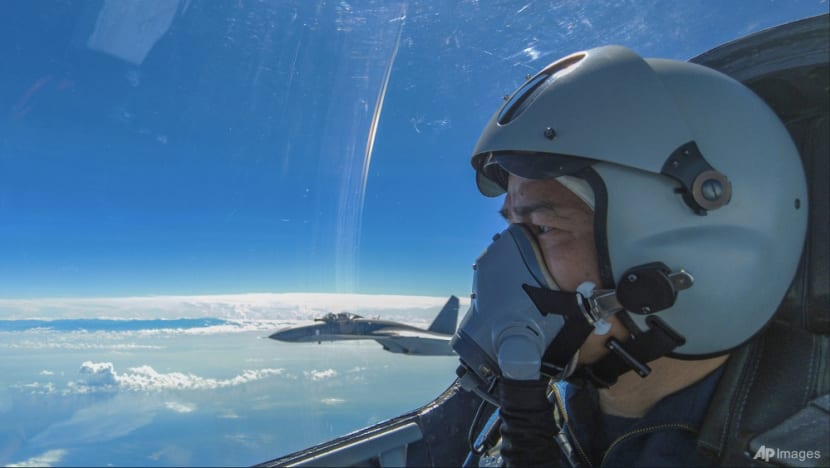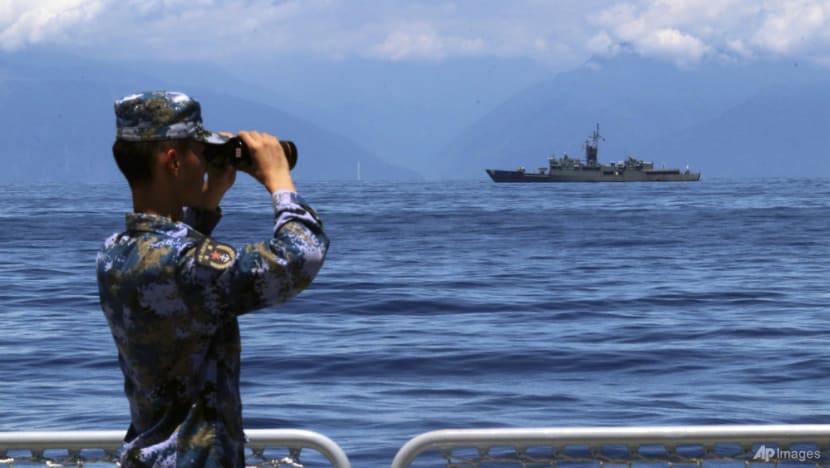'New normal' of China's military push across Taiwan Strait could spin out of control: Analysts
China’s violations of the imaginary centre line with Taiwan surged this year, after US House Speaker Nancy Pelosi's controversial visit to the island in August to show support for its leadership.

SINGAPORE: The "new normal" of China’s incursions across the imaginary median line down the Taiwan Strait could spin out of control and strain already tense relations between both sides, analysts said on Monday (Dec 19).
China’s violations of the so-called centre line with Taiwan surged this year, after US House Speaker Nancy Pelosi defied warnings from Beijing and visited the island in August to show support for its leadership.
China responded promptly and strongly, with the People’s Liberation Army (PLA) staging massive war games around Taiwan.
Since then, China’s military activities around the island have intensified, with the PLA routinely pushing planes and vessels across the Taiwan Strait, observers told CNA’s Asia First.
CHINA'S MEDIAN LINE VIOLATIONS
“China has now normalised the crossing of the median line,” said International Crisis Group China fellow Ivy Kwek, adding that the line has been a tacit agreement between the two sides.
By crossing the middle line, military aircraft from China can get much closer to Taiwan, which reduces the response time of (Taiwan’s) air force and in turn “increases the risk of escalation and untoward incidents between the two militaries”, she added.
“This situation is even more precarious if we consider that there is currently no crisis management mechanism between (China) and Taiwan, which might lead to a high chance of miscalculation of each other's intention.”
Beijing “did not let a good crisis go to waste”, and instead capitalised on Ms Pelosi's visit by increasing its patrols around Taiwan, said former US National Security Council official Paul Haenle.
“Now they have a more continuous and persistent presence around Taiwan, which gives their PLA, their Chinese military, some advantages that can help to sort of wear down Taiwan's operational capabilities, put pressure on Taiwan, and they can expand and contract this pressure without now eliciting as much of a response from the US and other regional actors," he said.
In the past, crossing the centre line was rare, said Mr Haenle, who served as the White House's China director on the National Security Council during the George W Bush and Barack Obama administrations.
“Today, it's become fairly routine,” he added, noting that China sent a record 18 bombers into Taiwan’s air defence identification zone last week.
“So this constitutes a sort of a new normal, and it gives the PLA a stronger and more advantageous position, which they now have after Pelosi's visit.”
However, Ms Pelosi’s controversial trip was not the first time a US House Speaker had visited Taiwan. In 1997, then-House Speaker Newt Gingrich also did so.
Mr Haenle, director at Carnegie China and chairman of Teneo Asia Pacific, said the question that many have raised is whether Taiwan is better off after Ms Pelosi’s trip.
Pointing out that the visit was just about two months before the important 20th Chinese Communist Party's Congress in October, he said: “The Chinese military was standing by to take advantage of the tensions as they rose and to respond to the crisis, in a way that now has given it a pretty significant military advantage.”
US’ CONCERN OVER THE FUTURE OF TAIWAN
At the Communist Party Congress, Chinese President Xi Jinping said China wants a peaceful reunification, but reserves the right to take all necessary measures including the use of force.
In November, on the sidelines of the G20 summit in Bali, Mr Xi told his US counterpart Joe Biden that the Taiwan issue is a “first red line” in bilateral ties that must not be crossed.
The future of Taiwan remains a concern for the US, especially in the aftermath of Russia’s invasion of Ukraine in February, said observers.
“The military aggression, and the military coercion and activity that the PLA is conducting around Taiwan is really intensifying and it's been intensifying for the last several years,” said Mr Haenle.

The ongoing Russia-Ukraine conflict “has put an international spotlight on the question of Taiwan” and whether military aggression could be used there, he added.
“And I think the US and other regional actors will try to do what they can proactively to try to prevent such an outcome.”
But analysts do not believe China has intentions of launching a full-scale invasion of Taiwan in the near future, despite setting a goal to turn the PLA into a modern military force by 2027.
“At the moment, we think that China has not fully developed the capability to guarantee a sure victory if it chooses to launch a military option on Taiwan,” said Ms Kwek.
“Because this is a major undertaking that has a high cost, a lot of uncertainties and also great risks, especially given that kind of attention that Taiwan is enjoying from the international community right now.”














